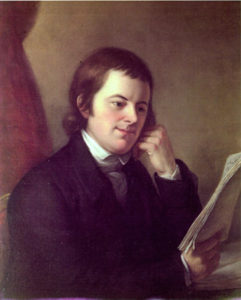The Volokh Conspiracy
Mostly law professors | Sometimes contrarian | Often libertarian | Always independent
Today in Supreme Court History: August 6, 1792
Editor's Note: We invite comments and request that they be civil and on-topic. We do not moderate or assume any responsibility for comments, which are owned by the readers who post them. Comments do not represent the views of Reason.com or Reason Foundation. We reserve the right to delete any comment for any reason at any time. Comments may only be edited within 5 minutes of posting. Report abuses.
Please to post comments



In re Equitable Office Bldg. Corp., 72 S.Ct. 1086 (decided August 6, 1946): Bankruptcy trustee’s plan of reorganization had been accepted by the Bankruptcy Court. Application to Justice Reed to stay consummation of the plan by two previously unobjecting stockholders who had found a refinancer with better terms. Reed holds that the lower court’s refusal to modify the plan was not discretionary and, citing Bankruptcy Code provisions as to appealability, grants stay. (Business was refinanced in 1947, though it later sold the building which, built in 1915, still stands, at 120 Broadway, downtown Manhattan. Full of law firms. I’ve been there many times. Big, old, echo-y bathrooms. Some big, old, echo-y lawyers too.)
Johnson served sixteen months and retired due to ill health (though he lived another 26 years) and participated in no major decisions. He did write at least one opinion, Georgia v. Brailsford.
From the secret smile on his face, one guesses that he’s spotted the obscene word that the Maryland Gazette always hides in its crossword puzzles.
"Now, when you paint me, make sure you paint me as a punchable sissy!"
Today was a pretty big day, historically speaking. I just want to make one other note; today is the anniversary of America's use of a nuclear weapon, in war, against Japan. That was a seminal moment in human history, and humankind was forever changed by this (for good or ill).
It is now some 80 years later, and Japan is one of our strongest allies; I hope we continue to do right by Japan. Our alliance will be tested soon.
Georgia v. Brailsford was the subject of three opinions, including one involving the only reported jury trial in the history of the Supreme Court. Thomas Johnson wasn't involved in that opinion.
Johnson's niece married John Quincy Adams.
The Voting Rights Act was signed OTD in 1965. It has been fodder for SCOTUS disputes over the years.
Thomas Johnson was the first non-inaugural member of the Court, succeeding John Rutledge, who had resigned from the Court in 1791 to accept the position of Chief Justice of the South Carolina Supreme Court. Johnson was also the first recess appointment to the Court. He was also the author of the Court’s first published opinion, the lead opinion in Georgia v. Brailsford, 2 U.S. (2 Dall.) 402 (1792),
Georgia v. Brailsford, you say?
From Chief Justice John Jay's instructions to the jury:
"It may not be amiss, here, Gentlemen, to remind you of the good old rule that on questions of fact, it is the province of the jury; on questions of law it is the province of the court to decide. But it must be observed that by the same law which recognizes this reasonable distribution of jurisdiction, you have nevertheless a right to take upon yourselves to judge of both, and to determine the law as well as the fact in controversy. On this and on every other occasion, however, we have no doubt you will pay that respect which is due to the opinion of the court: for, as on the one hand, it is presumed, that juries are the best judges of facts, it is, on the other hand, presumable that the court is the best judge of law. But still both objects are lawfully, within your power of decision."
https://supreme.justia.com/cases/federal/us/3/1/
It should, of course, go without saying that the power to *interpret* the law is not the same as the power to *nullify* the law.
Also, the court's views in the Brailsford case were overruled officially in 1895:
https://supreme.justia.com/cases/federal/us/156/51/